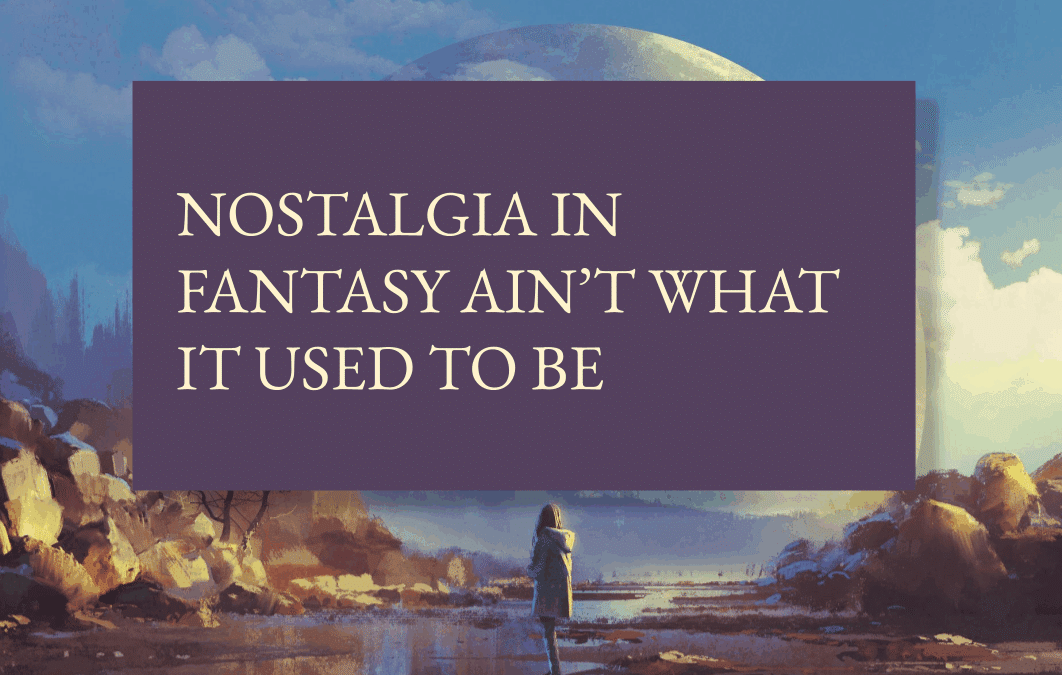Nostalgia is at once one of the most comforting and dangerous things in the world. It’s also a cornerstone of the fantasy genre.
Wait! Hear me out on this one.
Right from the beginning of modern fantasy, there has been a call to a mythic past. Part of this stems from Romanticism and the rose-tinted glasses people seem to put on when talking about Ye Olden Days of Yore.
As the world rapidly changed in the 19th century, society looked back on the past—especially the semi-mythic past where they could make stuff up—as a warm, cozy anchor or blanket to cling to as everything seemed to go a bit topsy-turvy.
So, as modern fantasy draws inspiration from these historical interpretations, it makes sense that these new fantastical worlds reflect this attitude.
The best, so the attitude says, has already happened. The wisdom of the past is better than the so-called wisdom of today. Back in the day, things were made to last, children respected their elders, and brave men did great deeds while women (who naturally knew their place) looked on in admiration.
You can see this throughout the fantasy genre. In The Lion, the Witch and the Wardrobe, it’s the Deep Magic from the Dawn of Time that’s important—not the magic we just knocked up last week with a few bits of string in the garden shed.
Older things are more powerful, mysterious, terrifying, virtuous—insert your adjective of choice. This is because they’ve stood the test of time and are relics of the ‘good old days’ of the setting.
What if you don’t agree? Should you bother reading on?
Yes. Because here’s the thing: if you’re aware of these tropes, you can use them or subvert them in your own writing.
Let’s talk Tolkien
It wouldn’t be a proper article about fantasy writing theory if I didn’t bang on a little bit about J.R.R. Tolkien.
‘The Monsters and the Critics’ is without a doubt worth a read. It’s one of the very best pieces on Beowulf as a work of fantasy. In this amazing essay, Tolkien discusses Beowulf’s death, heralding the end of the age of heroes. He’s the last one, and it’s now drawing to a tragic close. So even in the first piece of English literature, Saxon bards were thinking, ‘Well, things were a lot better in the olden days!’
Tolkien masterfully uses nostalgia in both The Lord of the Rings and The Hobbit.
In The Hobbit, the call to adventure through the dwarves’ song in ‘An Unexpected Party’ speaks of the wonders of Erebor. I won’t copy-paste the lyrics, but in addition to exposition, ‘Far over the misty mountains cold’ inspires a sense of longing for the past. It’s done brilliantly—with only a few verses, Tolkien paints a vivid picture of the dwarves of old and their great magic.
The One Ring is a great object because it is a direct callback to the Second Age of Middle-earth. Tolkien hammers this home with Sam’s song of Gil-galad—a great hero whose deeds are nearly forgotten, save by a few.
With both of these, you get the feeling that these stories take place in a much bigger, richer world. The setting didn’t just spring fully formed like Athena from Zeus’s forehead (nice little classics reference there, keeping things fancy). Rather, the past has shaped the present in which the story takes place.
You can use this in your own writing. Think about how the legends of the past in your world have influenced your protagonist—whether, like with Bilbo, they act as a ‘push’ factor to get him out the door (literally), or like Sam’s love of stories and tales, or Strider being haunted by the distant past.
No one wants a hero in times of plenty
If you’ve spent any time around middle-aged men on Facebook who like to talk about how loyal and/or dangerous they are, you’ll be familiar with the following quote (normally accompanied by a Peaky Blinders or Joaquin Phoenix Joker image):
Hard times create strong men. Strong men create good times. Good times create weak men. And weak men create hard times.
If you’re interested, the quote is from Those Who Remain by G. Michael Hopf. It’s a good book and worth a read if you like post-apocalyptic stuff.
But the take-home message here is that, chances are (unless you’re writing the fluffiest type of romance fantasy with cozy coffee shops and dragons making crème brûlée), your protagonists are going to be in the ‘hard times’ part of the cycle. But the key word here is cycle.
Now, it is well beyond the remit of this article to debate the existence of cyclical history. But bad stuff needs heroes to sort it out. Think about why your protagonist is facing their trials and tribulations and how they feel about it. Perhaps they hate the ‘weak men’ or remember with fondness the ‘good times’ of the past.
Evolving settings
So, what happens when things are changing, such as in a setting where the world is adapting, growing, and evolving? Let’s take the Discworld setting by Terry Pratchett.
In The Colour of Magic, the world is pretty much standard medieval-style fantasy in its tech levels, with very entrenched attitudes. This first starts to be challenged (‘So, why can’t women be wizards?’) in Equal Rites, and by the time the series ends (sob!) with The Shepherd’s Crown, you have steam engines, computers, professional football, newspapers—I could go on. The setting jumps forward about 500 years of technology in less than one generation. But then, this is the Century of the Fruitbat, after all!
So, in settings where the focus is very much on new things happening and new developments, what happens with nostalgia? Well, firstly, it can be adversarial. In Thud!, it’s the old attitudes of the Deep-Downers that Vimes fights against, trying to prevent ancient racial enmity from descending into bloodshed. Or in Guards! Guards!, where the cult yearns for the glory days of kings—and summon a dragon for their trouble.
The Discworld series is full of instances where progress is hampered by oppressive nostalgia or where rose-tinted jingoism (like in Jingo, as a matter of fact) threatens innocent people.
There’s also the question of relics. What happens to characters who are stuck in the past—but not opposing it as antagonists? A good example is Cohen. (That’s Emperor Cohen to you!) Cohen is an obvious parody of Conan and the answer to the question, ‘What happens when a barbarian hero gets old?’ He appears in The Light Fantastic as a companion to Rincewind and Twoflower and later conquers the Counterweight Continent with the Silver Horde in Interesting Times. Pratchett describes Cohen’s generation as the last ones who really knew how to do barbarian heroing.
Cohen’s final outing is in The Last Hero, which, for my money, is one of the very best Discworld books. It centres around Cohen’s rage against gods who let a man grow old and choke to death on a concubine (cucumber).
This leads to a brilliant moment when Carrot has to face down the greatest hero who ever lived. And Cohen, realising that because the Silver Horde have magic weapons and outnumber the hero six to one, they don’t stand a chance against a simple youth out to save the world. So they instead choose to go out with a bang—literally.
Passing-of-the-torch moments like these help to build a living bridge between your world’s past and the future your protagonists are building.
Jack Shannon is a massive nerd. He’s also the author of Brigandine, a Grimdark fantasy novel full of swords, bloodshed, and Lovecraftian horrors. If you like your books sweary, bloody, and just a bit funny, why not give it a read?
Do you write fantasy or science fiction?
Join our email list for regular writing tips, resources, and promotions.

